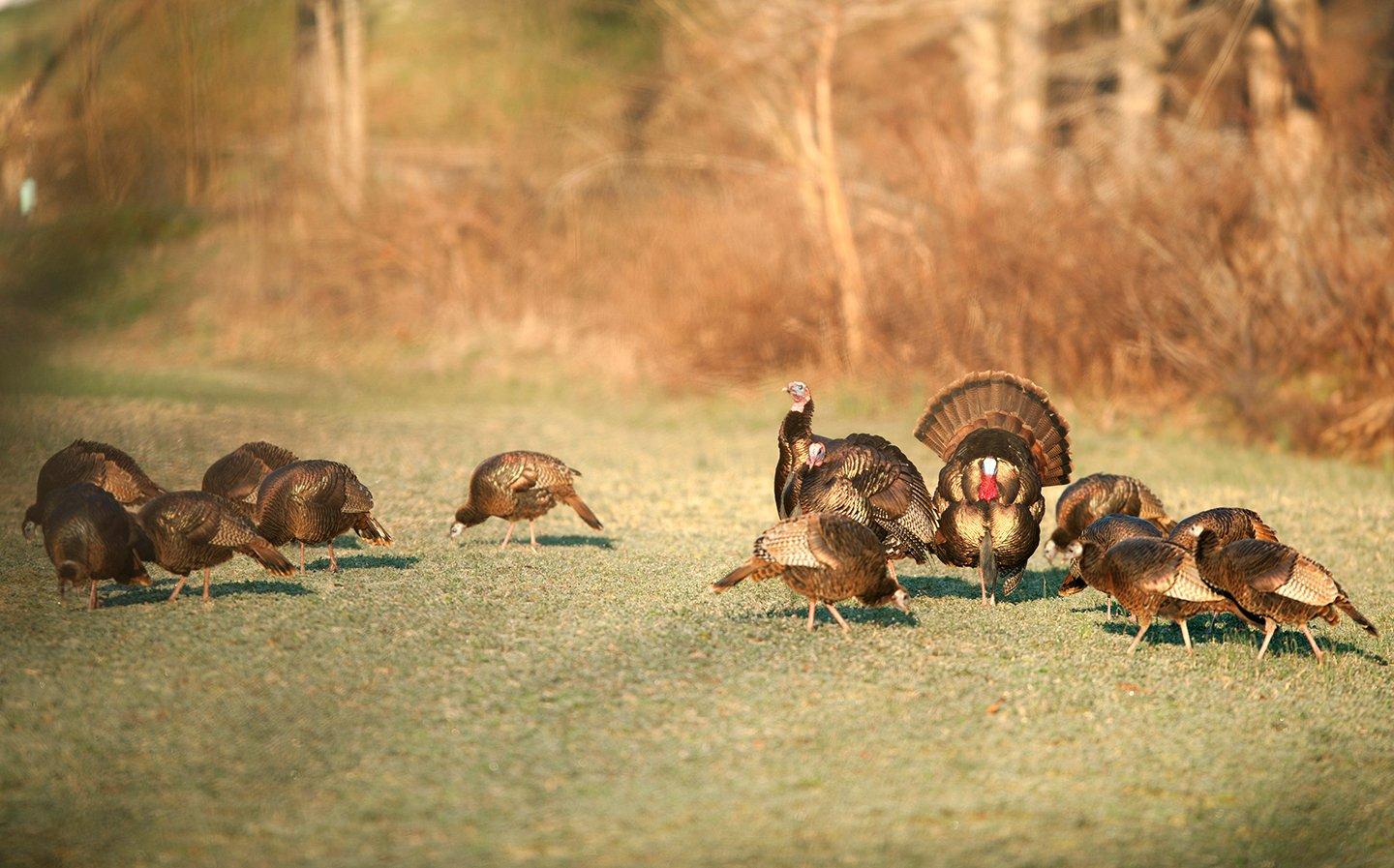Tired of yelping and listening to ornery old gobblers walk away? Turn the tables with these sneaky strategies.

Difficult-to-hunt turkeys might give you a hard time, but you have tactical options. Image by Bill Konway
One time, I hunted an old Virginia turkey that would gobble hard on the limb, fly down, gobble at every yelp, and then shut up and walk off. It went on like that for days. I wondered, “Am I calling too close to the gobbler? Maybe he is waiting for me, the “hen,” to come to him.” Time for a new plan.
The next morning, the turkey cranked up his pre-dawn serenade, but instead of sneaking within 100 yards of his roost, I backed off and set up 250 yards away. I tree yelped softly and gradually increased the volume of my calls until the gobbler thundered back. I called just loudly enough so he barely heard me.
The sun came up, and the bird with the 10-inch beard and sharp hooks strutted and gobbled into easy gun range. By changing it up and calling so far away from the roost, I made the turkey curious enough to pitch down and come check me out. It’s one way to deal with an ornery, seemingly uncallable gobbler. Here are three more tricks to try.
Sit Tight
A 3-year-old longbeard roosted with hens is one of the toughest birds. Most mornings, he’ll gobble, and his hens will yelp. Then all the turkeys will fly down, mingle a while, and march away from your calling. What then? Do you follow the flock, or try to flank the birds and call from a secondary location?
Neither. Try sitting tight at the roost site for a couple of hours if you have the time and patience. Listen a lot, and call a little.
As a breeding flock moves off toward a strut zone, the alpha tom has all the fun. He’ll bully any subordinate gobblers that tag along, and then breed the willing hens. After an hour or maybe two, the hens often leave to go to their nests. A lonesome longbeard often starts gobbling hard again. If he doesn’t gobble in more hens, he’ll sometimes circle back to the roost where he heard you calling earlier. One sweet yelp can bring him running.
Try a New Call
Day after day, a gobbler hears loud, fancy yelping and cutting on diaphragm, box, glass, aluminum calls. It might be you pressuring him with calling too much. Or multiple hunters on public land hammer the bird with popular calls. That’s when I switch to a call that my 6-year-old grandson can run like a champ.
I’ve called in many an unkillable gobbler by tapping clucks, whines and seductive yelps on a simple push-pin call. Don’t laugh. It works. A gobbler might come running to soft little calls he’s never heard before. And soft yelping on a push-pin won’t intimidate live hens like loud, raspy calling on a box or diaphragm can. Instead of driving hens away, little push-pin notes might lure the gals your way and bring that ornery strutter with them.
Patience and Discipline
This last strategy might be your best for a mean turkey, though it requires a lot of patience and discipline. If a bird kicks your butt for three or four mornings in a row, get it in your head that for the next couple of days, you will yelp softly and sparingly or not at all to him.
Rather, go back to where the devil roosts, and spend some time on recon. Listen as the turkey gobbles on the limb, flies down and moves away. Draw a line to the ridge or creek bottom where he travels. Does he head for a nearby field or clear-cut to strut? You can pattern a gobbler if you break the habit of running and gunning and beating him over the head with calling.
Listen and follow a turkey’s gobbles to get a good idea of where he travels. Lay back, bite your tongue, and take the pressure off for a few days. Then come back one morning, make a new approach to the roost and set up on a ridge or in a bottom where the turkey loves to walk. Run your best yelps, and get ready. The toughest turkey in the woods might run smack over you.
Don’t Miss: 10 OLD-SCHOOL TURKEY HUNTING TIPS












